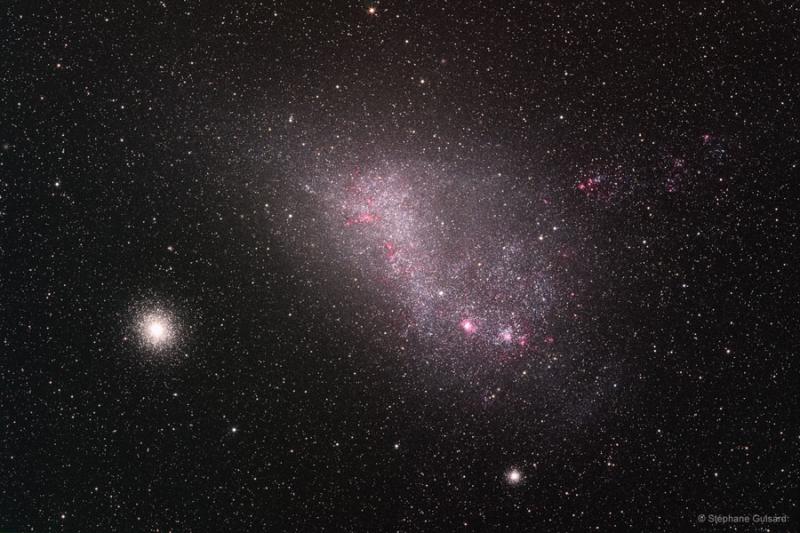Credit & Copyright: StИphane Guisard
Explanation:
Portuguese navigator
Ferdinand Magellan
and his crew had plenty
of time to study the southern sky during the
first circumnavigation of planet Earth.
As a result, two celestial wonders
easily visible for southern hemisphere skygazers
are known as the Clouds of Magellan.
These cosmic clouds are now understood to be dwarf
irregular galaxies,
satellites of our larger spiral
Milky Way Galaxy.
The Small
Magellanic Cloud
pictured above actually spans 15,000 light-years or so
and contains several hundred million stars.
About 210,000 light-years distant in
the constellation
Tucana,
it is the fourth closest of the Milky Way's
known satellite galaxies, after the
Canis Major
and
Sagittarius
Dwarf galaxies and the
Large
Magellanic Cloud.
This gorgeous view also includes two foreground globular
star clusters NGC 362 (top left) and 47 Tucanae.
Spectacular 47 Tucanae
is a mere 13,000 light-years away and seen here to the left of the
Small Magellanic Cloud.
1999 2000 2001 2002 2003 2004 2005 2006 2007 2008 2009 2010 2011 2012 2013 2014 2015 2016 2017 2018 2019 2020 2021 2022 2023 2024 2025 2026 |
Январь Февраль Март Апрель Май Июнь Июль Август Сентябрь Октябрь Ноябрь Декабрь |
NASA Web Site Statements, Warnings, and Disclaimers
NASA Official: Jay Norris. Specific rights apply.
A service of: LHEA at NASA / GSFC
& Michigan Tech. U.
|
Публикации с ключевыми словами:
SMC - irregular galaxy - Малое Магелланово Облако - Неправильная галактика
Публикации со словами: SMC - irregular galaxy - Малое Магелланово Облако - Неправильная галактика | |
См. также:
Все публикации на ту же тему >> | |
